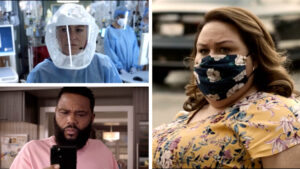
Not only has COVID-19 changed the way we interact in our daily lives, it also has changed the entertainment we rely on for escape.
With the pandemic showing little sign of slowing down, TV and movies have in part shifted their focus onto something that has affected everyone worldwide. It has forced the dynamics of Hollywood to be possibly changed forever.
As we see a rise in COVID-19 plots throughout film and television, viewers are bound to have opinions surrounding America’s favorite past-time. Is this new change in media for better or worse?
Essential and health care workers have been slammed since the start of the virus, and for most people going home and being able to escape the troubles of reality has been a relief, especially for those who are reminded daily of the lives lost. For Lakirstan Hooks, a University of Mobile nursing major, the use of COVID-19 storylines seems a bit unrealistic at times but also can shine the light on some real-life irregularities or misconceptions about the virus.
“I don’t want to be reminded of it every day more than I have to and being in the health care field I feel like I get a triple dose of overwhelming emotion. I would rather have a show that disconnects me from this horrible time we’re going through, but I also understand how it would benefit people who watch who don’t believe in the seriousness of the virus. It’s cool to see sometimes on screen even when it can be a tad unrealistic, but if people get to see a ‘better’ view of the madness maybe it’ll caution viewers to get on board with public heath safety,” Hooks said.
While some have concerns about TV and movies, some viewers are intrigued as to how networks and studios will spin the COVID-19 into creative storylines that will grab the audience’s attention. Senior FAMU student, Keyera Dennis, thinks the entertainment industry shouldn’t center the entire premise of shows on the virus and drain viewers, but defiantly touch important aspects while making them interesting.
“I think it’s nice to incorporate things happening currently and not just ignore the entire fact like it’s not impacting thousands. It would be interesting to see what they can put together to incorporate it accurately but also having the ability to even see what we’re living in for so long and/or how they portray the pandemic years from now,” she said.
Since the pandemic hit early March 2020, TV and movie productions were slowed down to minimize the spread of the virus. Following the city re-openings to full capacity, networks are hammered with overlapping policies that leave actors and viewers concerned for safety. For New York native Taylor Crowley, seeing COVID played out on screen is slightly unsettling in relation to the number of cases spiking across New York City.
“There are so many continuity issues with actual COVID-19 protocols. Actors are standing way closer than six feet, and always holding their masks or just not at all in some scenes. Some shows pick and choose when to tastefully address the issue, if it serves the plot, but the majority have landed on a happy medium. I’m glad our favorite shows are back, but I wish they didn’t always hit so close to home,” Crowley said.
As the pandemic rages on, some consumers raise the point that we’re still living through COVID-19 and its effects, so the implementation of these storylines are a bit pre-mature.
“If they aren’t going to do it now, they will in the future, so the question should be how soon is too soon. We don’t know the outcome of things or how the pandemic will end. Things are changing every single day, new medicines, new strains. I just think it’s too soon to kick off a COVID-19 storyline in 2021,” said junior FAMU student Madison Nettles.